
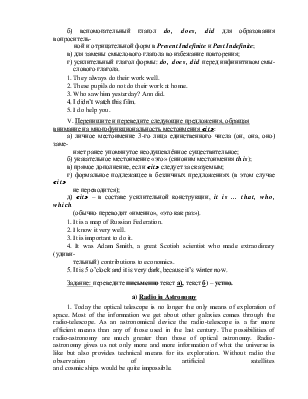
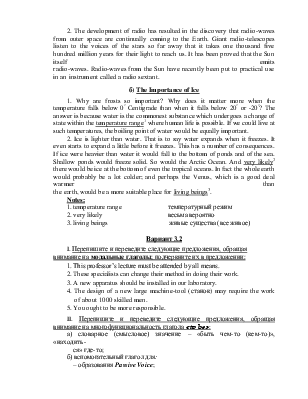
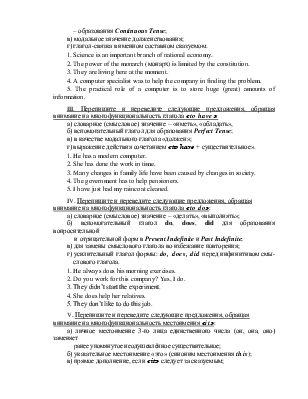
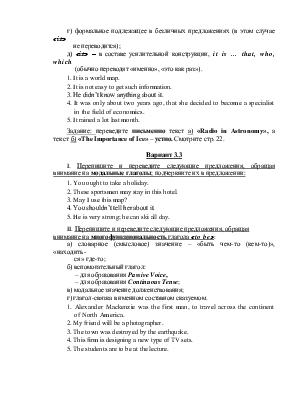
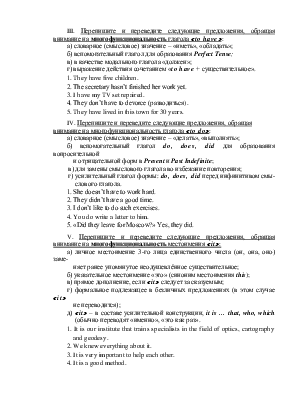

professor should help his students with their research work.
4. They may use this unique device.
5. The doctor should be very attentive while examining the patient.
а) словарное (смысловое) значение
– «быть чем-то (кем-то)»; «находиться
где-то»;
б) вспомогательный глагол для:
– образования Passive Voice;
– образования Continuous Tense;
в) модальное значение долженствования;
г) глагол-связка в именном составном сказуемом.
1. Lasers are now used for many scientific, medical and industrial purposes.
2. Because the beam (луч, пучок света) is so small, it
is very important in
delicate surgery and is used in eye operations.
3. Students are to be at the lecture in time.
4. He is translating a very difficult text now.
5. His task is to prepare everything for the experiment.
а) словарное (смысловое) значение – «иметь», «обладать»;
б) вспомогательный глагол для образования PerfectTense;
в) в качестве модального глагола «должен»;
г) выражение действия сочетанием «tohave + существительное».
1. I have a good library.
2. He will have done this work by Monday.
3. She has to help her younger sister.
4. I’ve just had my hair done.
5. The delegation has already arrived.
а) словарное (смысловое) значение – «делать», «выполнять»;
б) вспомогательный глагол do, does, did для образования вопроситель-
ной и отрицательной форм в Present Indefiniteи Past Indefinite;
в) для замены смыслового глагола во избежание повторения;
г) усилительный глагол формы: do, does, didперед инфинитивом смы-
слового глагола.
1. They always do their work well.
2. These pupils do not do their work at home.
3. Who saw him yesterday? Ann did.
4. I didn’t watch this film.
5. I do help you.
а) личное местоимение 3-го лица единственного числа
(он, она, оно) заме-
няет ранее упомянутое неодушевлённое существительное;
б) указательное местоимение «это» (синоним местоимения this);
в) прямое дополнение, если «it» следует за сказуемым;
г) формальное подлежащее в безличных предложениях (в
этом случае «it»
не переводится);
д) «it»– в составе усилительной конструкции, itis … that, who, which
(обычно переводят «именно», «это как раз»).
1. It is a map of Russian Federation.
2. I know it very well.
3. It is important to do it.
4. It was Adam
Smith, a great Scotish scientist who made extraodinary (удиви-
тельный) contributions to
economics.
5. It is 5 o’clock and it is very dark, because it’s winter now.
Задание: переведите письменно текст а), текст б) – устно.
а) Radio in Astronomy
1. Today the optical
telescope is no longer the only means of exploration of space. Most of the information we get about other galaxies
comes through the radio-telescope. As an astronomical device the radio-telescope is a far more efficient
means than any of those used in the last century. The possibilities of
radio-astronomy are much greater than those of optical astronomy.
Radio-astronomy gives us not only more and more information of what the
universe is like but also provides technical means
for its exploration. Without radio the observation of artificial satellites
and cosmic ships would be quite impossible.
2. The development of radio has resulted
in the discovery that radio-waves from outer space are continually coming to
the Earth. Giant radio-telescopes listen to the voices of the stars so far away
that it takes one thousand five hundred million years for their light to reach
us. It has been proved that the Sun itself emits
radio-waves. Radio-waves
from the Sun have recently been put to practical use
in an instrument called a radio sextant.
б) The Importance of Ice
1. Why are frosts so important? Why does it matter more when the temperature falls below 0° Centigrade than when it falls below 20° or -20°? The answer is because water is the commonest substance which undergoes a change of state within the temperature range1 where human life is possible. If we could live at such temperatures, the boiling point of water would be equally important.
2. Ice is lighter than water. That is to say water expands when it freezes. It even starts to expand a little before it freezes. This has a number of consequences. If ice were heavier than water it would fall to the bottom of ponds and of the sea. Shallow ponds would freeze solid. So would the Arctic Ocean. And very likely2 there would be ice at the bottom of even the tropical oceans. In fact the whole earth would probably be a lot colder; and perhaps the Venus, which is a good
Уважаемый посетитель!
Чтобы распечатать файл, скачайте его (в формате Word).
Ссылка на скачивание - внизу страницы.